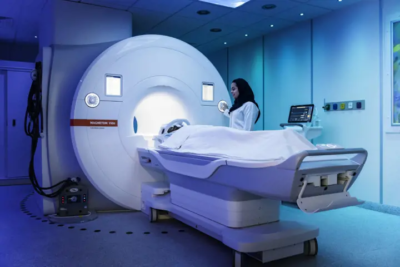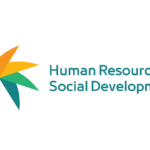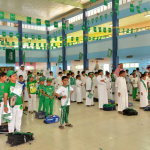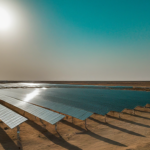
“My inspiration for this piece was based on the unprecedented and unparalleled moment it dawned on me that, for the first time in my life, I would not be able to visit Al-Haram (Grand Mosque). It made me realize what an honor, privilege and blessing it was to be able to do that.”
-Nabila Abuljadayel, Saudi artist, depicted an empty Grande Mosque with a solo worker in her latest painting. [arabnews.com]

“Saudi Arabia acted, not reacted, to the pandemic…The Kingdom already provides free healthcare for all its citizens, which is an important element in a strong healthcare infrastructure, necessary to weather this pandemic. Moreover, the gender gap in the sector is minimal, ensuring that everyone has equal access to proper health care.”
-Dr. Reem bint Mansour Al-Saud, member of the Kingdom’s permanent delegation to the UN in New York, in an interview with Arab News. [arabnews.com]

“For the first time since the Great Depression both advanced economies and emerging market and developing economies are in recession. For this year, growth in advanced economies is projected at -6.1 percent. Emerging market and developing economies with normal growth levels well above advanced economies are also projected to have negative growth rates of -1.0 percent in 2020, and -2.2 percent if you exclude China.”
-Gita Gopinath, outlining the IMF’s World Economic Outlook for April 2020. [IMF]

“Somewhat quietly since about 2012 or so, nation states of the Middle East, led by Saudi Arabia and the UAE, commenced a quiet surge to the forefront of implementing comprehensive cyber security regulations. It took a wake up call: wave after wave of deep, egregious breaches of their industrial infrastructure, especially oil refineries and power plants.”
-Byron V. Acohido, Pulitzer Prize-winning business journalist, reports on cyber security steps in the Middle East including Saudi Arabia’s Cyber Security Framework implemented in 2017 mandating the requirement to containerize data in all computing formats. [Security Boulevard]

“We are still dealing with uncertainty related with the virus and its impact…The will is there, and the structure is there….Flexibility and pragmatism will enable us to continue do more if we have to. We have to watch what’s happening with demand destruction or demand improvement, depending on how things evolve.”
-Prince Abdulaziz bin Salman, on a conference call with reporters on Monday. Saudi Arabia is ready to cut oil production further if needed when the OPEC+ alliance meets again in June, the Prince said. [bloomberg.com]

“Having affordable, reliable, accessible energy supply is considered a necessity to enable basic services, including health care, and help our efforts in assisting economic recovery.”
-Prince Abdulaziz bin Salman Al-Saud, Saudi Arabia’s Minister of Energy, in an opening speech to a video-conference of the G20 energy ministers this morning. [Reuters.com]

“Women owned nearly half of the 27,000 online shops registered on the Ministry of Commerce’s Maroof (E-commerce) portal last year.”
-Madison Clough, writing in Arab News, comments on the increasing numbers of Saudi women generating income on-line. Another aspect of how social and commercial restrictions due to Covid-19 health precautions are accelerating e-commerce growth in Saudi Arabia. [Arab News]

“These policies are a reminder to citizens that being Saudi means having a state that looks after its sons and daughters, not only a state that provides ‘human rights to citizens.'”
-Yasmine Farouk examines how Saudi Arabia’s response to the Covid-19 pandemic has reaffirmed traditional perceptions of the relationship between Saudi society and its leadership. [Carnegie Endowment for International Peace]

“Nobody’s asked me, so if they ask I’ll make a decision…[U.S. producers] are already cutting back and they’re cutting back very seriously. I think it’s happening automatically.”
-President Donald Trump, on whether the U.S. would participate in oil output cutbacks as part of a larger deal with OPEC and Russia. [Bloomberg]

“It is an unprecedented measure that has not been taken by Aramco before. May Official Selling Prices (OSPs) will depend on how the OPEC+ meeting concludes. We are doing what we can to make it (the meeting) successful, including taking this extraordinary step to delay the OSPs.”
-A unnamed Saudi source, in comments to Reuters, on Aramco’s delay in announcing it’s official selling prices which are typically issued on the 5th of each month. [Reuters]











